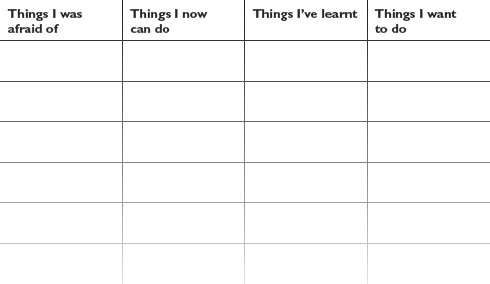WHAT HAVE YOU FOUND OUT ABOUT YOURSELF AFTER YOUR SEPARATION?

Thriving in your new life
It’s over, just about. And haven’t you just had the best time? No, you haven’t, you poor thing. But you have made it. And you’ve probably got a pretty amazing playlist of ‘I Will Survive’-type songs to go with it.
So, well done you. Probably by now your life is looking very different from how it looked when you were married. You might have (in no particular order):
• changed your kids’ schools
• changed jobs or negotiated more family-friendly hours
• finalised your property settlement
• finalised your parenting plans
• sold the family home
• rented a new home
• bought a new home
• bought a new car
• taken up new hobbies
• returned to university or other formal education
• been in the midst of a family law court battle (poor you)
• finalised your divorce
• repartnered
• had to create a new co-parenting relationship with your ex
• dealt civilly with your ex on a regular basis.
It’s a lot, isn’t it?
Probably you’ll look back on this time of your life as one of the hardest things you’ve ever had to go through. And it’s not something that you get over easily, or quickly. But you’ve probably really grown as a person, too.
A good friend of ours learnt to drive later in life than most of her friends—she got her licence when she was twenty-two. She was a very anxious driver and tried to do it as little driving as possible. But when she was suddenly single, she had no choice but to drive, and to drive a lot. Her mother lived an hour and a half away, along Sydney’s M5 (the scariest road in Australia, in our opinion) and if she wanted to see her (which she did), she’d have to drive there. Four years later she’s an extremely confident driver (possibly overly confident) and manages peak-hour city traffic daily. It’s such a small thing but a big deal for her—she never thought of herself as a competent driver and now she knows she is.
You might find yourself to be a totally different person from the person you were when you were married. You might have found new love, and you might be living in a new house with new stepchildren. You might find that while your life was turned upside down, you’ve made it even better than before.
You might have gotten a dog (your ex hated dogs), you might have gotten a cat (your ex was allergic to cats). You might have had to move houses, but perhaps you’re finding that life is better than ever in your own little home where you don’t have to walk on eggshells all the time.
Rebekah rediscovered the joy of running—it kept her sane during year twelve and it did the same again after her separation. Not only has she now done three marathons and a whole lot of half marathons, she found a fantastic community and an incredibly supportive bunch of girlfriends at her local parkrun and has thrived as a result.88
You might still be grieving the life you imagined, or the life you planned. For some, divorce means the end of the dream to create a family, or to have more children. It might mean financial insecurity at an age when you thought you would be comfortably well off. It might mean having to share grandparenting duties with your ex-spouse at a time when you had dreamed of enjoying them together. Having said that, re-prosecuting every aspect of your failed marriage, and holding on to your anger and grief, can be very destructive.
If you find that you’re still very upset and angry with your former spouse after a few years have passed, or if you’re finding that you’re still fighting with your former spouse over things like respecting each other’s boundaries, it can be very helpful to speak with a counsellor, who can give you strategies to reduce your emotional responses to your ex.
Boundaries and mutual respect are the best tools at your disposal to help you form a productive and, yes, amicable relationship with your ex, particularly if you have children. The ultimate goal is to get to the acceptance stage of grief—indeed, to no longer be grieving, because you’ve well and truly moved on.
The most useful advice we ever heard was from a psychologist who said, ‘We’re all just fancy monkeys trying to do our best’, which sums up the futility of trying to work out why people do the things they do. It took time, and patience, and good will on all sides, but both Rebekah and Lucy have functional co-parenting relationships with their former husbands. It can be done.
Divorce isn’t easy. It has decades-long ramifications. But with a bit of bravery, you can remake your life to be yours, and it can be a great life. Remember, you’re divorced from your ex, you’re not divorced to them.
As JK Rowling, the patron saint of divorced people, said, ‘Rock bottom became the solid foundation on which I rebuilt my life’. And so it can be for you.
We know, because it was for us.